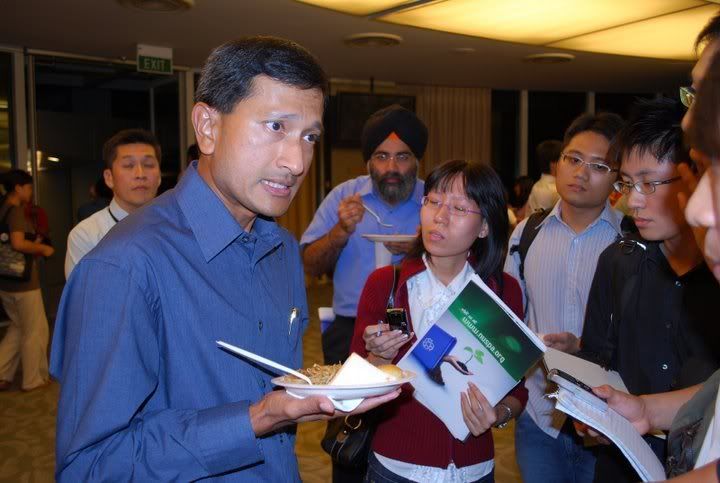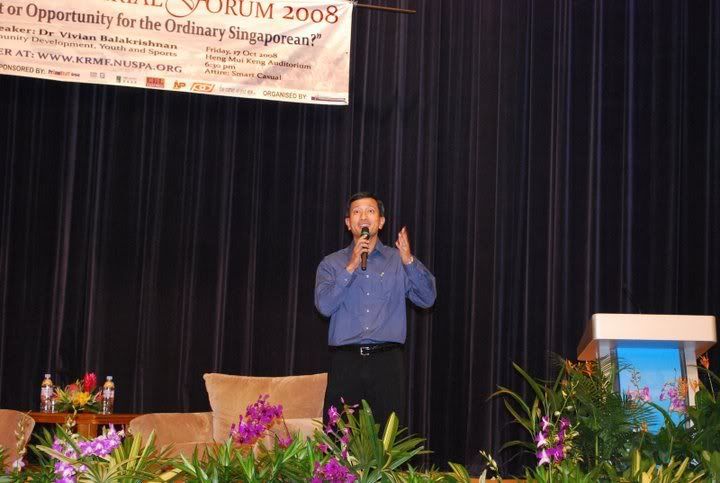Terence Lee / Youth Editor
 Even though Singapore is set to become a more open society in the future, the government is making no apologies when it comes to suing politicians for defamatory remarks, said Dr Vivian Balakrishnan, Minister for Community Development, Youth and Sports.
Even though Singapore is set to become a more open society in the future, the government is making no apologies when it comes to suing politicians for defamatory remarks, said Dr Vivian Balakrishnan, Minister for Community Development, Youth and Sports.
Speaking to the The Online Citizen (TOC) after the Kent Ridge Ministerial Forum held yesterday at the National University of Singapore (NUS), Dr Balakrishnan added that the government takes attacks on accuracy and integrity very seriously, because “establishing a high trust environment” is an advantage that gives Singapore an edge in a competitive global economy.
He said: “We don’t mind political openness, but we don’t want too much of the excitement. To the outsider, when they look at Singapore, they know that politics here is serious, it’s accurate, it’s real and accountable. It’s not a situation you get in other countries. We’re an outlier, but we are outlying because we want to keep our politics honest.”
The minister also said that both sides must play the same game, even for the PAP. “If I say something unethical or unfair against any of my opposition colleagues, they can sue as well,” he added.
However, such instances are few and far between.
According to the Inter-Parliamentary Union (IPU) , while opposition MP Chiam See Tong has “successfully obtained damages for defamation from PAP members in three instances,” many other lawsuits filed by opposition party members have been dismissed.
Earlier this month, the SDP was ordered to pay $610,000 in damages to the Minister Mentor Lee Kuan Yew and Prime Minister Lee Hsien Loong over defamatory remarks made in a 2006 article written in The New Democrat, the party’s newspaper.
Openness – “In Singapore there are no secrets”
 Openness was one of the many themes talked about by Dr Balakrishnan as he gave his address during the forum. He regaled the audience of about 320 with numerous anecdotes, preferring to distance himself from the podium and addressing the crowd without a script.
Openness was one of the many themes talked about by Dr Balakrishnan as he gave his address during the forum. He regaled the audience of about 320 with numerous anecdotes, preferring to distance himself from the podium and addressing the crowd without a script.
Politician, story-teller, and big brother – the minister juggled many hats while addressing the students.
Illustrating how faraway events can have a significant impact on the Singapore, he shared how he switched on the television at night and saw the World Trade Centre collapse after returning home from a fund-raising dinner.
That event was what got him into politics.
“That was the night I know for sure that I was going to go into politics. There are things to protect, things to fight for, and it’s not just enough to just talk about it,” he said.
In view of maintaining an open society, he also highlighted the opportunities and threats of globalisation, and how transparency is key to Singapore’s future success.
“Everything we do is under public scrutiny,” he said. “In Singapore there are no secrets, if I cock up you will know. At least within the PAP, we select on the basis of merit, and we are also totally unsentimental about dropping people. It’s almost a samurai code. We’re not a group of friends who got together one night and decided we want to run Singapore and enrich ourselves.”
Being Singaporean
In his speech, he also emphasised the need to be open to Singaporeans who went overseas in search of opportunity but whom may choose to come back in the future.
“We must not be judgmental. I was never quite comfortable with the ‘stayer or quitter’ notion. It’s not very fair to some of the Singaporeans out there,” he said.
In defining one of the special traits of Singaporeans, Dr Balakrishnan related an instance where MM Lee was taken on a cruise round St John’s island and Sentosa to look at potential sites for the future casino.
Coming back to the city in the evening where the panorama of City Hall could be seen, Dr Balakrishnan asked MM Lee how he feels knowing that there was hardly anything there when the PAP first took power.
“I was expecting some wonderful gem of wisdom or emotionally-moving, earth-shaking moment,” he said, to laughter from the audience. “But MM Lee is not like that. He looked at me gruffly and said, ‘the hardworking and disciplined people built all this.’”
Nevertheless, the minister acknowledged the flipside to the high standard of competitiveness in Singapore, recognising that there have been calls to “go slow, be less stressful and less competitive.” But he also said that this is “the karma for Singapore, whether you like it or not.”
Q & A
 Some students in the later question-and-answer session took him to task on the issue.
Some students in the later question-and-answer session took him to task on the issue.
One asked about whether the notion of meritocracy is still relevant for Singapore’s future, given a renewed emphasis on creativity. He said that there is currently too much emphasis on grades.
Another student wondered if anything could be done to lessen the load on university students so that they can have opportunities to develop their own interests. She also felt that the current university system disadvantage Singaporeans against people from other countries.
Ms Marianne Marker, a 24-year-old exchange student from the University of Copenhagen in Denmark, made a similar sentiment during the question and answer session.
She also said after the forum: “I don’t think I would be able to cope if I study here. I really admire Singaporean students because it’s really difficult. Back in my country, if you get a C, it’s not the end of the world. Employers don’t look at grades as much.”
In response to the students, Dr Balakrishnan replied that students must make their own trade-offs during their university days. Speaking in a more colloquial manner, he shared with the audience his own university days, where he tried studying really hard but gave up after three months.
He said: “So I decided, all I need to do now is to aim for a C, and I can tell you my 5 years in university were very enjoyable. And I guess I’m probably where I am now because I made that trade-off. And I learnt so many things beyond medical textbooks, and I made so many friends beyond medical school.”
Mr Vicknesh Rajamohan, a 22-year-old arts student from NUS, felt reassured after the forum. He said that Dr Vivian seemed to be “aware of the happenings in the grassroots, and that if he “truly believes and acts in the way he speaks, then the future of Singapore is safe.”
“But having said that, I still hope he isn’t just words, and that is a fear I have of PAP leaders. But I hope to be optimistic,” he said.
————-
